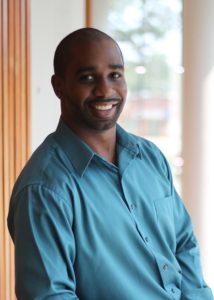
Dayle Hodge had been working as a biomedical engineer before deciding to pursue his dream of earning an M.D./Ph.D. But, upon enrolling at Albert Einstein College of Medicine, he also discovered a calling to open doors to science careers for younger students of color.
Hodge’s outreach mission was driven by his recognition of the advantages he had and his awareness of the gap in diversity in medicine. Growing up, he was lucky enough to gain exposure to health care professionals, but many students from backgrounds underrepresented in medicine and research have nobody in their lives who can help guide them to enter the field.
“I think it’s critical to provide that kind of exposure if we’re going to try to fix the ‘leaky pipeline’ in STEM education,” said Hodge.
As a first year student in 2010, Hodge got his start in diversity outreach by organizing the Einstein American Medical Association “Doctors Back to School” visit, where medical students visit local high schools to talk to students about becoming physicians. When Hodge transitioned into the Ph.D. phase of his training, he joined the Einstein Minority Scientists Association executive board. He has visited local middle and high schools to discuss pursuing careers in science, medicine, and STEM fields. He also worked with the Mentoring in Medicine (MIM) pipeline program, where he helped organize their health career expo that engages 1000 students and parents annually. As Vice President of the Einstein Student National Medical Association (SNMA) chapter he made community outreach a chapter priority.
And, over the past four years Hodge has acted as a research mentor for Einstein’s Summer Undergraduate Mentorship Program. This has given him experience in teaching and curriculum design, and helped him to develop mentorship skills in the setting of academic medicine, which he plans to pursue. In addition, he has mentored students in Einstein‘s Postbaccalaureate Research Education Program (PREP), an NIH-funded program that helps underrepresented students prepare for competitive Ph.D. programs.
Hodge will defend his Ph.D. thesis this fall and enter the clinical rotation phase of medical school, on track to graduate with his M.D. and Ph.D. in 2019. He plans to continue his outreach work throughout.
